Welcome to our websites!
Joystick Controls for Electric Wheelchairs and Their Benefits for Users
The Evolution and Significance of Electric Wheelchair Joysticks
Electric wheelchairs have revolutionized mobility for individuals with disabilities, granting them independence and access to the world around them. Central to the operation of these devices is the joystick, a small yet mighty component that plays a critical role in their functionality. Over the years, the design and technology of electric wheelchair joysticks have evolved dramatically, reflecting advancements in engineering and a better understanding of user needs.
The Design and Functionality of Joysticks
At its core, the joystick is an interface that allows users to navigate their electric wheelchairs with precision and ease. Typically mounted on an armrest, the joystick is designed to be user-friendly, requiring minimal physical effort to operate. Most joysticks operate through a simple mechanism where the user pushes the stick in the desired direction, translating that movement into electronic signals that control the wheelchair’s motors. This intuitive design makes it accessible for people with varying degrees of mobility.
In recent years, the design of joysticks has also incorporated ergonomic principles and customizable features. Some models come with adjustable sensitivity, allowing users to set the responsiveness of the joystick to match their level of physical control. Additionally, various joystick shapes and sizes can accommodate different hand functionalities, ensuring that users can operate their wheelchairs comfortably, whether they have full hand movement or limited dexterity.
Technological Advancements
With the rise of smart technology, electric wheelchair joysticks have also embraced innovations that enhance their functionality
. For instance, many modern joysticks are equipped with additional features such as programmable buttons, which allow users to set shortcuts for common functions (like speed adjustment or horn activation). Moreover, some advanced models incorporate touch-sensitive screens that display real-time data, including battery life, speed, and distance traveled, offering users a comprehensive overview of their mobility status.Another notable advancement is the integration of Bluetooth and smartphone connectivity. This development enables users to control their wheelchairs through a mobile app, providing an even more personalized experience. Additionally, these apps can offer navigation aids and safety features, creating a seamless interface between wheelchair operation and personal mobility management.
electric wheelchair joystick

Importance of Joysticks in Enhancing Independence
The significance of electric wheelchair joysticks extends beyond engineering and technology; they are pivotal in promoting independence and improving the quality of life for users. For individuals with mobility challenges, the ability to control a wheelchair independently can lead to greater participation in social activities, employment opportunities, and general daily living tasks. The joystick certainly plays a crucial role in facilitating this sense of autonomy.
Furthermore, therapeutic benefits can also be derived from the use of electric wheelchair joysticks. For individuals undergoing rehabilitation, operating a joystick can help improve hand-eye coordination, fine motor skills, and overall cognitive engagement. Thus, the joystick not only assists in mobility but also contributes to the physical and mental well-being of its users.
Challenges and Future Directions
Despite the advancements in joystick technology, challenges remain. Users sometimes face difficulties in controlling their devices due to conditions such as tremors or spasms. Continuous feedback from users can guide future innovations, leading to the development of more adaptive joystick designs, such as those that can mitigate unintended movements.
Looking ahead, the future of electric wheelchair joysticks seems promising, as ongoing research and technological innovations pave the way for more intuitive and user-centered designs. As society continues to prioritize inclusivity, the evolution of electric wheelchair joysticks will play a vital role in ensuring that individuals with mobility limitations can navigate their environments with independence and confidence.
In conclusion, the electric wheelchair joystick is more than just a control device; it's a gateway to freedom and empowerment for countless individuals. As advancements continue to emerge, it is vital that designers and engineers stay attuned to the needs of users, ensuring that these crucial tools evolve in ways that genuinely enhance the quality of life for all.
-
Transforming Healthcare with Hospital FurnitureNewsJun.24,2025
-
Rehabilitation EquipmentNewsJun.24,2025
-
Mobility and Independence with WheelchairsNewsJun.24,2025
-
Freedom of Mobility with Our Rollator WalkersNewsJun.24,2025
-
Comfort and Independence with Commode ChairsNewsJun.24,2025
-
Bathing Safety and Independence with Shower ChairsNewsJun.24,2025
-
Navigating the Wholesale Landscape of Electric Mobility Solutions: Key Considerations for Power Wheelchair DealersNewsJun.10,2025











